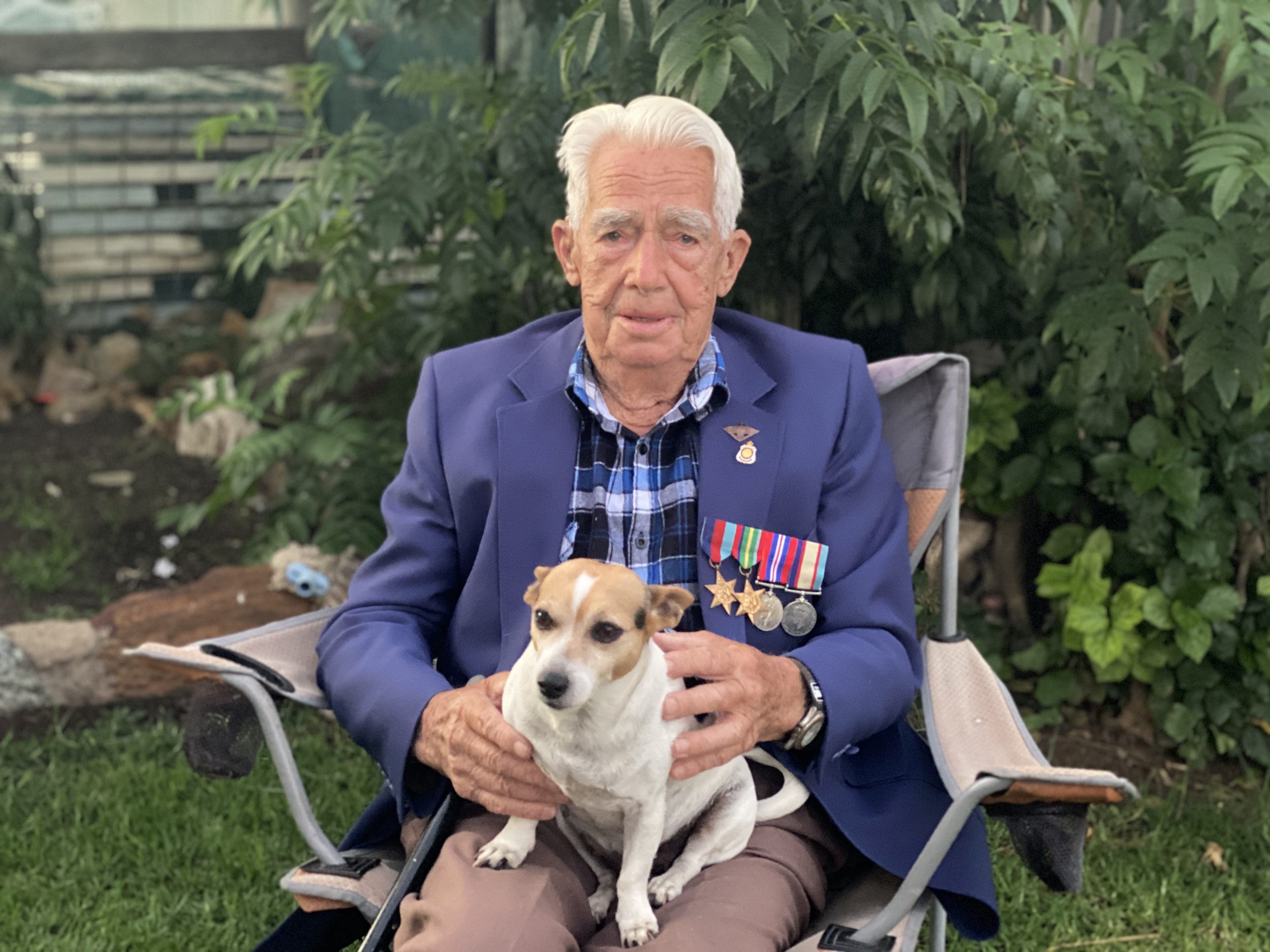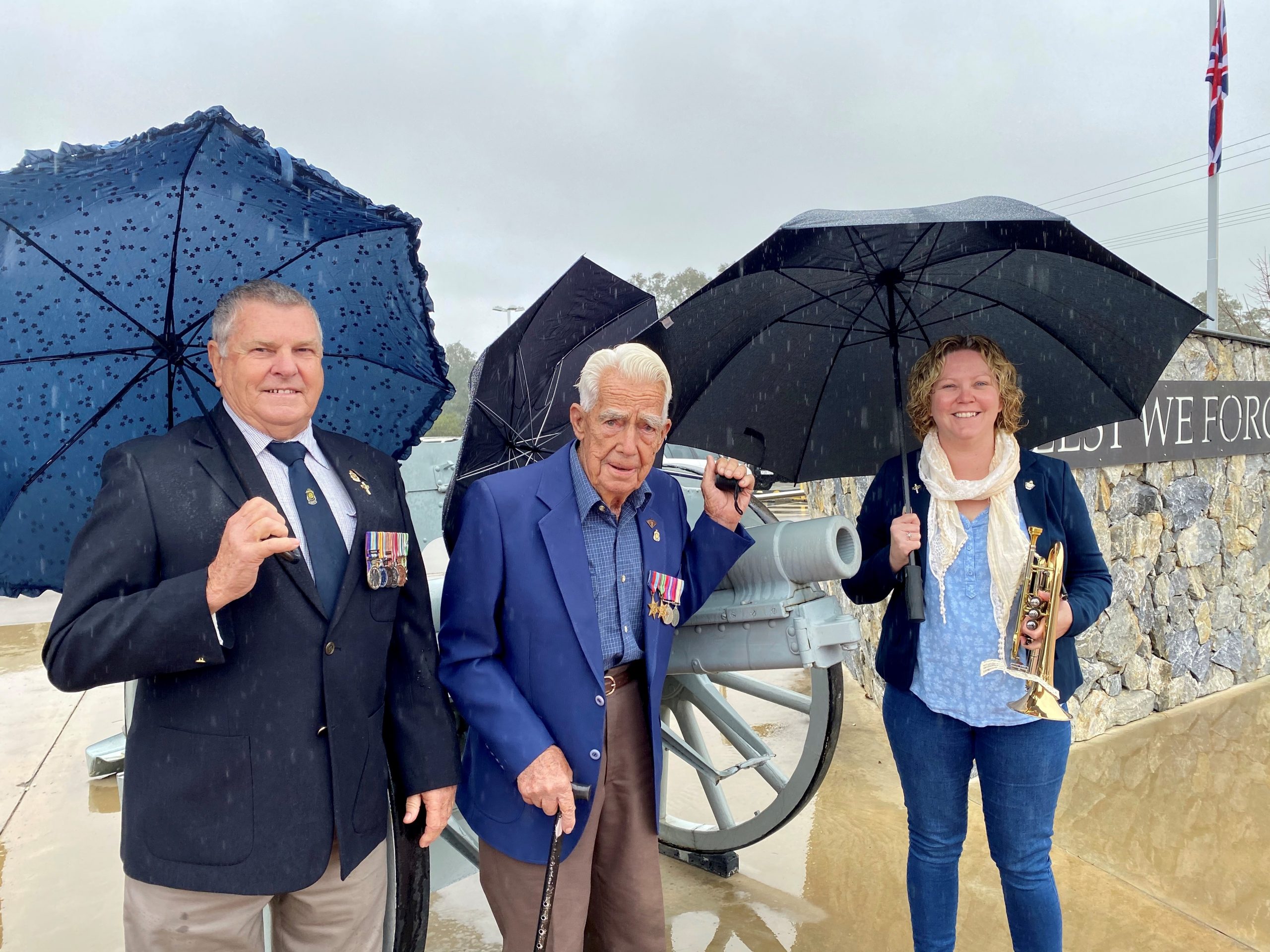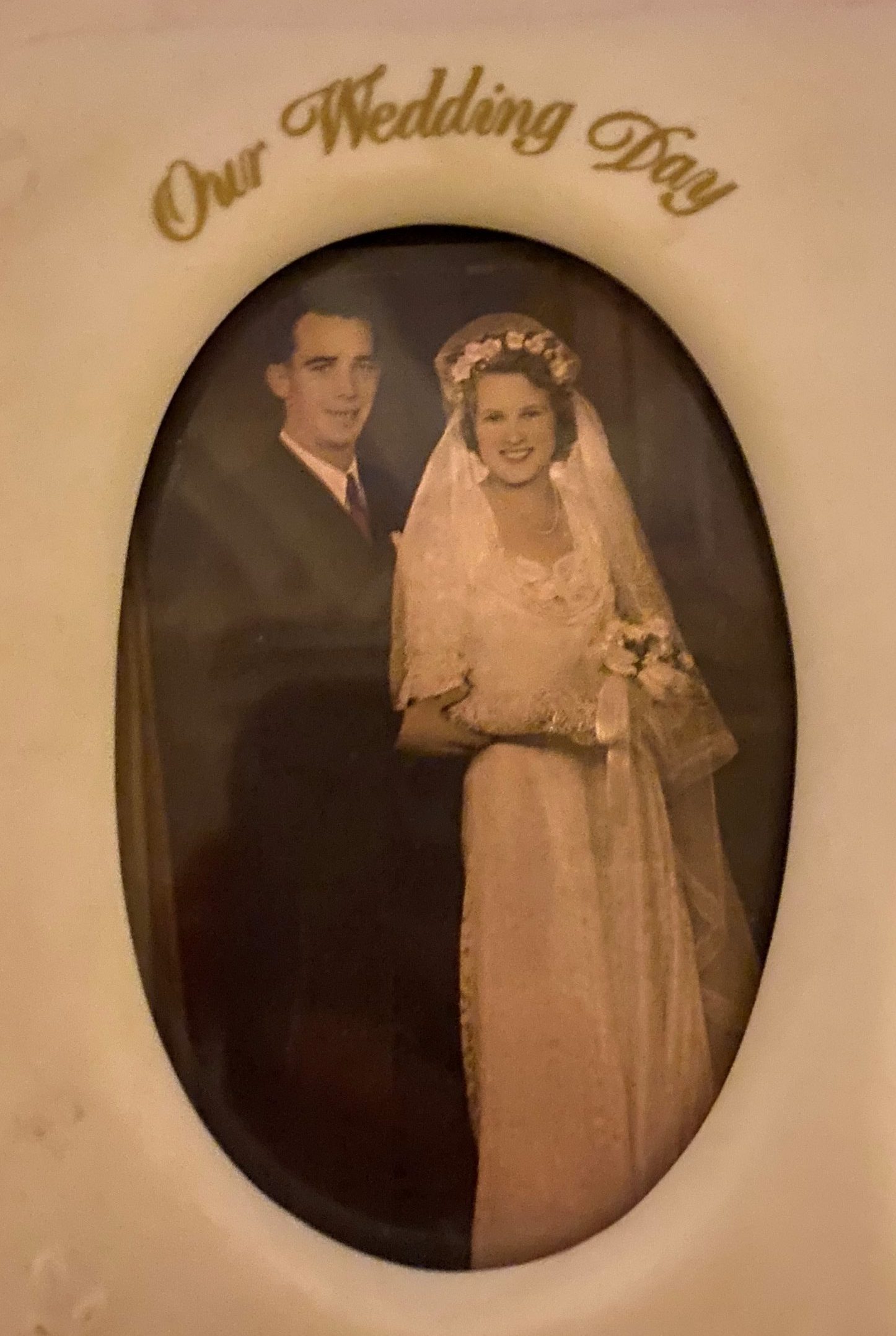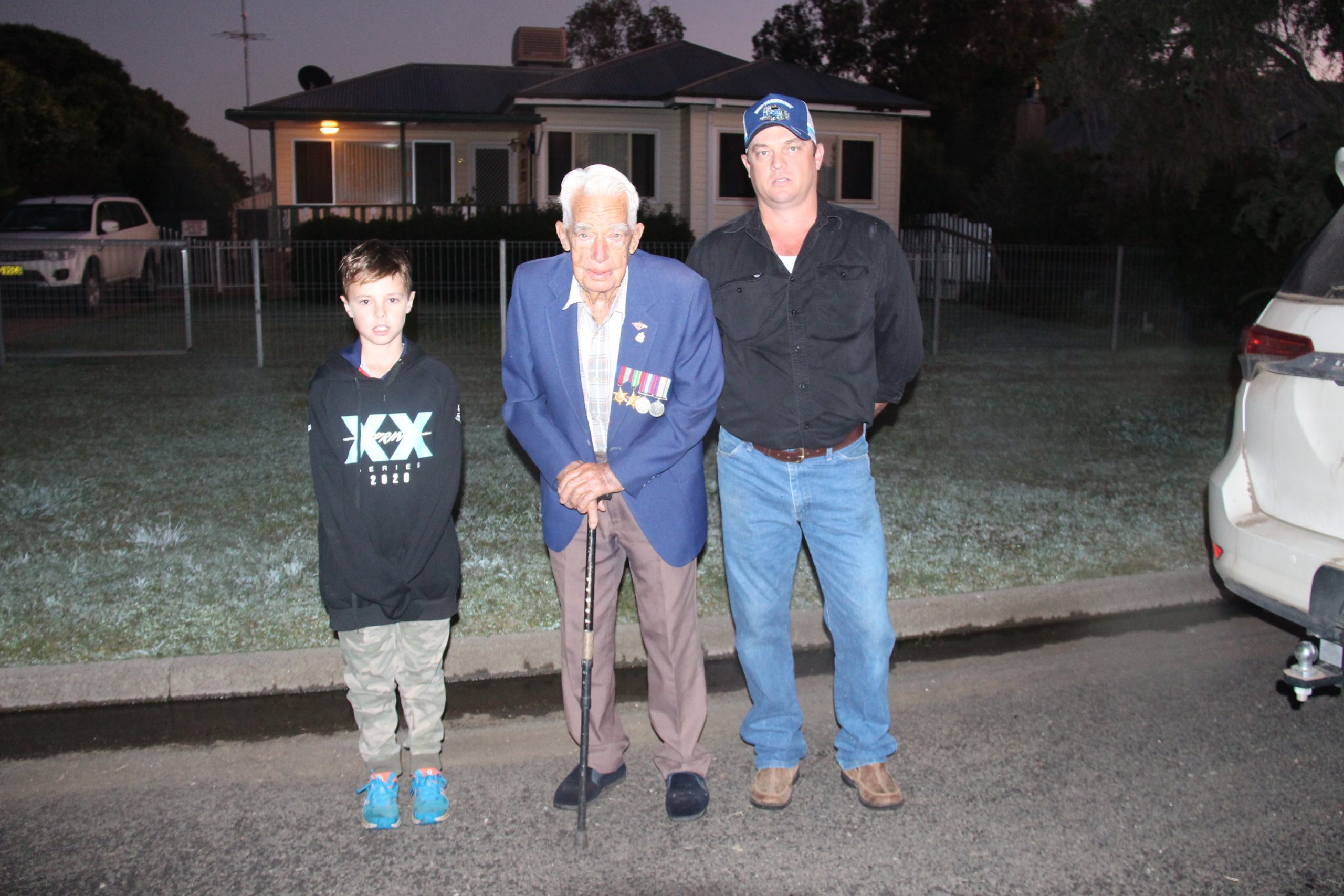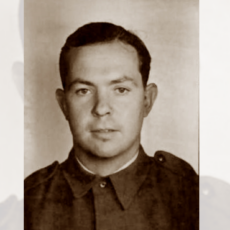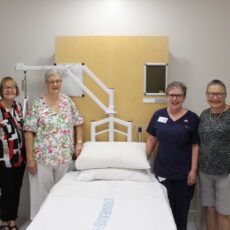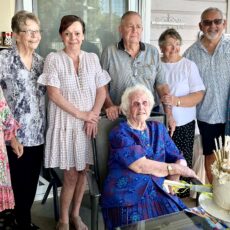On Saturday, a small but hugely significant ceremony was held at the Narrabri RSL Club to commemorate the 75th anniversary of VP Day – Victory in the Pacific.
On August 14, 1945 Japan confirmed it’s acceptance of the Allies’ demand for unconditional surrender.
The next day, on August 15, 1945 the surrender came into effect and celebrations were held across Australia from city streets to country towns.
Men, women and children rejoiced as news broke that World War II had finally come to an end.
“Fellow citizens, the war is over. The Japanese government has accepted the terms of surrender imposed by the Allied Nations,” announced then Prime Minister Ben Chifley to the nation.
The threat of a Japanese invasion on Australian soil had been stopped and victory in the Pacific had been declared. It was an historic moment.
However, for many of the women and men still serving on the frontline it was a momentous occasion marked in far-flung locations, a long way from home.
“It came over the radio that the war had ended, and they’d signed the papers,” said Wee Waa resident John Collett who was serving in the Aitape-WeWak campaign in northern New Guinea at the time.
John Collett served as a gunner in the 2/1st Field Regiment 6th Division, an Australian Army artillery regiment.
“Everyone was expecting it (victory), but there was nowhere to go up there to celebrate.
“I was pleased it was over, but I didn’t leave New Guinea then until January. I got discharged sometime in May 1946.”
John Collett, who prefers to be called John rather than Mr Collett, will turn 94 later this month.
He’s fit as a fiddle, fiercely independent and has big strong shearer’s hands the size of dinner plates, which reflect the fact John’s never been afraid of a hard day’s work.
Even today, he can still be found collecting his own firewood out at Gwabegar with friend Alan Galagher.
At the tender age of 16, John decided he was ready to put his hand up to go to war.
“Some of the other young blokes had left to go and I thought, ‘well, I’m going to go to’,” said John.
“It was something to do.”
John was young, fearless and after a difficult childhood he didn’t mind the idea of a new adventure.
“Well you might as well say I never really had a home to miss at that time,” he said.
“My mum and dad split up when I was about four and my brother Noel was two.
“My mum left and my brother and I were sent to live with people in Morrisett, and then later my dad brought my brother and I to Wee Waa.
“I stayed in Wee Waa and my brother was sent to Burren.”
John said he had a good relationship with his grandparents, who he said were one of the original farming families at the Wee Waa property ‘Eskdale’.
“When I was young and came back to live in Wee Waa, old Tom Collett (John’s grandfather) put an ad in the paper that a boy wanted a job on a place and that’s how I came to go to Peak Hill,” said John.
“The people at Peak Hill were good to me.”
Peak Hill, NSW is where John was living and working when he signed up for service.
“I was 16 and nine months,” he said.
Of course, you had to be 18-years-old to join the war effort so John was underage, but he certainly wasn’t the only young man who managed to wrangle together a ‘signed’ letter to join his mates and fight for Australia’s future.
“One day in Peak Hill there were some army officers that came around wanting volunteers and enlisters, and I went in and then got the signed paper and the next minute I got a letter in the mail to go to ‘so and so’ at Marrickville in Sydney,” recalled John.
“You had a medical to decide whether you were in or out, so pretty much whether they’d give you a uniform or not, and that was it.
“I got the letter to be in the camp the next morning or as soon as I could get there. “
John was part of the Citizen Military Forces from June 30, 1943 to August 4, 1943, and he attended training camps near Albury NSW and Chidlow in Western Australia.
He joined the Australian Imperial Force on August 5, 1943 and trained for New Guinea in Queensland.
“We did our jungle training to go to New Guinea on the Atherton Tablelands,” he said.
“One day we boarded the boat at Townsville, and we didn’t really know where we were going to until we got off the boat.
“We got off the boat at Aitape, New Guinea.”
John Collett served 403 days overseas in the Aitape-WeWak campaign, which has been described as ‘hard, bloody and wearing’.
“It was a dirty war,” said John.
The Australian portion of the Aitape-Wewak campaign took place in northern New Guinea between November 1944 and August 1945, according to The Australian War Memorial records.
Aitape had been occupied by the Japanese in 1942.
Recaptured by an American landing on April 22,1944, it was developed as a base area to support the continuing drive towards the Philippines.
In order to free American troops for the Philippine operations, defence of the area was passed to Australian forces.
More than 440 Australian lives were lost and more than 16,000 were admitted to hospital due to illness during the long campaign.
John Collett still keeps a book published by the Department of Veterans’ Affairs about the Aitape-WeWak campaign, and it states: “The Japanese lost 9000 killed and 7700 square kilometres of territory, a decisive factor in the final victory of Australian forces.
“The Australians who served in the Aitape-WeWak campaign were professional and determined, and their endeavours added to our proud military tradition.
“The Allied forces in this campaign successfully cut off the Japanese base at WeWak so that its garrison was incapable of presenting a further serious threat.
“They also liberated territory for which Australia was responsible and which later became part of a nation of Papua New Guinea, our nearest neighbour.
“The campaign ended with the cessation of hostilities in World War II.”
Two Australians who served at Wewak were Victoria Cross recipients, the highest decoration for gallantry and bravery – Lieutenant Albert Chowne and Private Edward Kenna.
John said he hasn’t spoken much about the war before because he felt “it was gone and forgotten”.
However, John said he’s now ready to share some memories especially when it comes to passing on stories to his grandchildren.
John clearly remembers the climate in New Guinea.
“It was humid all the time, you’d be sopping wet after the rain and then you’d be dry and then you’d be sopping wet again.
“But I never got crook, I never got malaria or anything like that.
“You had to have your uniform on all the time – in New Guinea it was shorts or long trousers, but it was all pretty light stuff and we were looked after well with clothing.”
John said he remembers reading The Guinea Gold newspaper, which was published daily by the Australian Imperial Force in Port Moresby.
He also remembers hearing Japanese propaganda on the radio.
“It was called Tokyo Rose, always saying the Japanese were ‘doing this and they’re doing that’ but they never said they were getting defeated or anything like that,” recalled John.
John’s strong disdain for the Japanese style of warfare is written all over his face when he talks about his old World War II enemy.
“What about all the poor wretches that they flogged and starved,” he said.
“‘It would be a different Australia today if the Japanese had won, the way the Japanese troops treated the Australians was shocking.”
John said he wasn’t afraid to go to war and seemed to handle the harsh realities of it.
“I never worried about not coming home,” he said.
“What’s the use in being scared? You can’t do anything about it.”
John described the ‘Fuzzy Wuzzy Angels’ (the local civilian porters and carers) as “great people”.
“You’d see some of your mates go out on patrol and a couple wouldn’t come back or another bloke might be wounded.
“If they were wounded then the ‘Fuzzy Wuzzies’ would get them back to the camp where it was and then they’d go to the doctor or if you were injured badly then you got shipped straight away.
“They used to be the luggage carriers, they’d come out with you and carry the box of ammunition or whatever. They were very good.”
John said there was one very close call that rattled him, and it came from an ally.
“I was there when the Americans mistook us, our camp, for the Japanese and they bombed and machined gunned us,” said John.
“They were supposed to bomb and machine gun the Japanese who were only just across the bay.
“They must’ve forgot what they looked like up in the air.
“One of the blokes ran out with a flag and that’s when they flew off, he waved the Australian flag to show that we were Australian.
“They came in and then they went around to do a second bombing but must’ve seen the flag.”
The Veterans’ Affairs book John keeps a copy of also writes about the fatal American mistake that happened on May 7, 1945.
“Australians who were concentrated around Cape Wom were mistakenly attacked by American Lightning aircraft. Eleven Australians were killed and twenty-one wounded. The real enemy were on WeWak Point, which the 2/4th Battalion attacked on May 10,” it states.
Next to that paragraph in the book, John has scribbled, ‘I was there’.
“I never saw them die, but I saw them after they were killed because that afternoon, they buried them on the beach just up above the high watermark,” said John.
“The next day the gravediggers came and got them, and they probably went out to Lae, there’s a big army cemetery there.”
John witnessed firsthand the devastation and despair of the war, but he truly valued the mateship.
“The ones that were in your unit are the best in the world because you’d die for one another,” said John.
John said the late Jack Baguley from Narrabri was a great mentor to him in New Guinea.
“Friends like Jack, if you got spooked or something they’d say ‘oh come one, everything is alright, keeping going’.
“He called me ‘Junior’.”
There were a number of servicemen from Wee Waa who John said he didn’t know before he went to war, but they became great friends afterwards, bonded by the experience.
John said he remembered being on the gunner as it fired over the top of the late Wilf Boyle while he was working on the roads, as the unit was trying to gain ground. Mr Boyle, formerly of Spring Plains, served as an engineer in the Aitape-Wewak campaign and John stayed friends with him when they both returned to Wee Waa after the war.
Sadly, John’s friends from the war have all passed away now.
“I would love to meet another Australian bloke who was there that’s still alive.”
John said he has no regrets about making the decision to go off to battle and feels fortunate he was able to return to Australia to build a wonderful life and family.
And enjoy the Australian way of life that he fought to defend when he was serving in New Guinea.
“I suppose if it happened again, I’d do it again,” he said.
John has lived in Wee Waa since the end of the war, it’s the town where he married his late wife Fay and where they raised their children.
“She was a very nice looking girl and everything about her was pretty good actually,” John said.
“Buggered if I know how I got to end up with her.
“We went together for a little while, then we decided to get married and we were married 61 years.
“She was a telephonist at Burren on the exchange and she worked as a nurse at the hospital.”
John and Fay had three children Terry, Gary and Judith, and John now has seven grandchildren and 16 great-grandchildren to keep him on his toes.
“Fay and I both loved our kids. We went for a family holiday every year, didn’t matter where it was.
“And when I was working as a shearer, we used to go around in a caravan together to all the shearing sheds when Gary and Terry were only little fellas. “
After the war, John turned his hand to many jobs, mostly roles on the land.
“I was on the railway too for a little while earning something like four pound 10 – that’s about $9 a week.
“My brother was a shearer and when I saw what he was doing and thought I’d take it on.”
John spent the rest of his working life in shearing sheds across the North West and New England.
John said the fact he and his brother Noel were separated at a young age meant they “didn’t really grow up as brothers”, as much as he would’ve liked too.
They weren’t given the opportunity to have a close sibling relationship, but were reunited later in life and incredibly the two brothers who lived separate lives married two sisters.
Today, John is still pretty active and likes to keep to a daily routine which includes a walk to the newsagent in the morning, a chat out the front, a few jobs and a Tooheys with friend Bruce Cowan late afternoon.
However, if there is a commemorative ceremony taking place then John will be there rain, hail or shine to honour his mates, just as he was at the Narrabri RSL club on Saturday.
“You do think about your mates, you think about the ones you left behind and couldn’t get home,” he said.
Saturday’s ceremony (article below) also paid tribute to those who bravely served our country in Vietnam. veterans with August 18
To order photos from this page click here
